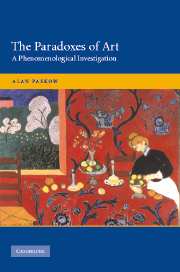2 - Things in Our World
Published online by Cambridge University Press: 27 March 2010
Summary
In the previous chapter, I argued that the fictional beings of artistic experience are much closer in significance and reality to the so-called real beings of our everyday lives than most analytic aestheticians, and perhaps even most reflective people in the West, would acknowledge. Because my claim is fairly radical and perhaps even counterintuitive, we need to return to the foundational issues that Heidegger has already investigated. Much of the remainder of this book will make sense only after I have called attention to and described the various modes or ways by which we relate to ordinary, everyday things – tools, furniture, fruit, apparel, and so on, as well as to people (to be discussed in Chapter 3). These things are indeed ordinary and everyday, yet, like the fictional beings with which we from time to time dwell, we rarely allow them to identify and fully reveal themselves and, consequently, to clearly announce the special kinds of gifts they present to us. Thus, I believe that we need to view “the world” (and ourselves) differently, to return to and recover the sorts of things that we have always in a way known, but that we have tended not to take seriously, regarding them instead as “unimportant,” “insignificant,” merely “subjective.”
We have arrived at this kind of skeptical understanding of our own perceptual activity principally, I think, because of three dialectically related reasons:
the complexity, ambiguity, and interpersonal unverifiability of certain features of first-person experience;
the capacity of these features to lure us into places of unwanted disquietude; and
[…]
- Type
- Chapter
- Information
- The Paradoxes of ArtA Phenomenological Investigation, pp. 83 - 122Publisher: Cambridge University PressPrint publication year: 2004



